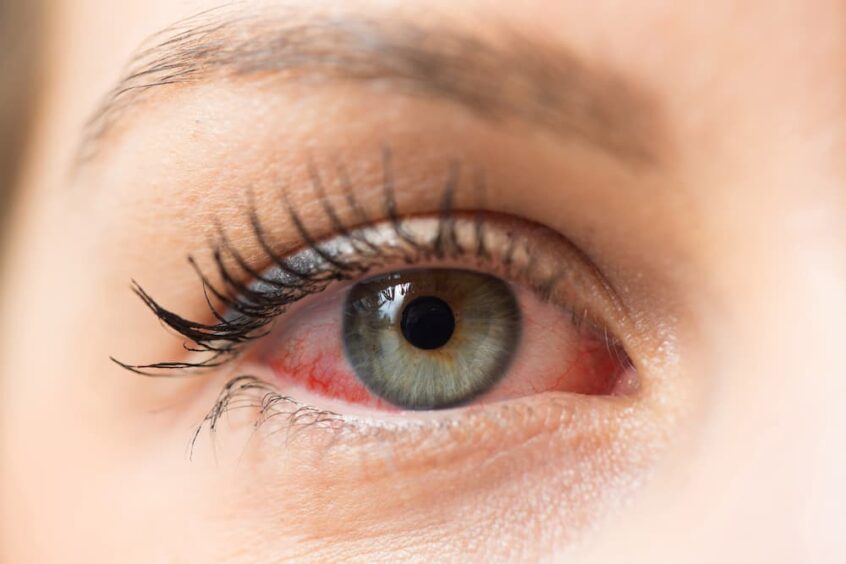Most people experience dry eye symptoms at some point in their lives. But for some people, the irritation becomes persistent, and it can impact the quality of their lives and the health of their eyes. Our ophthalmologist experts at Southwest Eyecare are familiar with dry eyes and what you can do to make them feel better. Let’s take a look at the basics of this common and persistent problem.
What is Dry Eye?
If you’ve ever experienced the gritty, sandy, burning feeling of dry eyes, then you know how miserable it is. Your eyes might be red and itchy, and they may burn. Some people experience sensitivity to light, eye strain, and blurry vision. They may even have watery eyes as their eyes try to produce enough tears to reverse the dryness.
But although it seems like adding moisture should solve something called “dry eye,” the condition is more complex than that. It can be because the body is not making enough tears at all, but it often is caused by a problem with the composition of the tears.
The tears that bathe your eyes are a mixture of water, oil, mucus, antibodies, and proteins. The oil helps stop the water from evaporating too quickly, and mucus helps spread the tears evenly over the eye’s surface. Antibodies and proteins protect the eye from infections.
If the composition of your tears lacks any of these elements, the result can be dry eyes. For example, the ducts that deliver oil to the eye’s surface can become blocked, preventing the oil from reaching where it’s supposed to go. At that point, the tears that reach your eye evaporate before they can soothe and moisturize the tissue like they’re supposed to.
Problems in the production or quality of tears can be caused by a number of conditions, including some autoimmune disorders, hormonal changes, aging, and certain medications.
How Is Dry Eye Diagnosed?
You may be pretty sure from the description that you are suffering from dry eyes, but if you’re experiencing any of these symptoms, it’s very important to have your eyes checked out by an ophthalmologist. It’s vital to see your eyes’ health because dry eyes can lead to other complications. Other conditions can also cause similar symptoms, so a doctor should rule them out before starting treatment.
An ophthalmologist will examine your eyes, then do tests to determine the thickness and quality of your tears. They will also test to see how quickly you can produce tears.
Once they have a clear idea of your eyes’ condition, they can devise a plan to relieve your symptoms. If simple lifestyle changes, such as over-the-counter eye drops, don’t solve the problem, there are other things you can try, including prescription eye drops and devices called punctal plugs.
We’ve cared for many patients with serious dry eye symptoms at Southwest Eyecare. As anyone who lives in Albuquerque can tell you, the arid climate here is hard on the eyes. It’s important to tackle problems before they get worse. We are well versed in what does and doesn’t work to help our patients feel better quickly.
Let Southwest Eyecare Help You Find Relief for Your Dry Eye Symptoms
If you’re suffering from dry eye symptoms, let the skilled professionals at Southwest Eyecare help you. Our ophthalmologists have the expertise and experience to find solutions that work for you.
Please contact us today for more information or to schedule an appointment.
Dry eyes may seem like a small problem, but they can greatly affect your life. We can give you the help you need.
Many people who deal with migraines have visual disturbances along with the pain. Most of the time, these affect both eyes and may look like checkerboard patterns, rings around lights, or dim spots in your vision. Ocular migraines, on the other hand, are relatively rare, and they can be more serious.
Also known as retinal migraines, this condition can occur with or without a migraine headache, and the symptoms are more intense. They usually only occur in one eye, and sufferers can see twinkling lights, zigzagging lights, or blind spots in their field of vision.
If you experience a sudden change in your vision and you’ve never been diagnosed with ocular migraines, you should contact an ophthalmologist immediately. The symptoms could also point to a detached retina or eye stroke, both of which require emergency treatment.
What causes ocular migraine?
Like migraine headaches, the causes of ocular migraines are not well understood. Research shows that there are changes in the way blood moves through the brain during an attack. They may be caused by reduced blood flow to the eye or spasms in the blood vessels in the retina.
In many cases, certain triggers induce an attack. These vary by person and can include:
- Changes in the weather
- High levels of stress
- Lack of sleep
- Fluctuating hormones, especially a drop in estrogen
- Chocolate
- Foods that contain tyramine, such as aged cheese, smoked fish, soy products, and hard sausages
- Food additives
- Cigarette smoke
- Perfume
- Bright or flashing lights
You may be more susceptible to ocular migraines if you have a family history of migraines. Women are more likely to experience them than men, possibly due to the influence of fluctuating hormone levels as a common trigger. Typically, ocular migraines affect individuals between the ages of 30 and 39.
Treating and Preventing Ocular Migraines
If you experience an ocular migraine, the best course of action is to rest until you feel better. Find a dimly lit room to relax in and reduce the pain. It’s important to give your eyes a break from prolonged screen time. A cool compress over the eyes can provide soothing relief for some individuals.
As mentioned, if this is the first time you experience these symptoms, you should contact an ophthalmologist as soon as possible. It is worth seeing a doctor even if you have experienced ocular migraines before. Seeking medical attention can result in receiving a solution that can benefit your condition, and it is always advisable to have a comprehensive evaluation of the condition.
To prevent future attacks, it’s helpful to keep track of your daily activities and what you eat. Your goal is to identify the triggers that cause the migraines so that you can avoid them in the future. This may take a little sleuthing, but the results are worth the effort.
Expert Care, Advanced Technology: Southwest Eyecare Is the Place to Go
If you live in the Albuquerque area and struggle with ocular migraines or any other eye problem, we invite you to see us at Southwest Eyecare. Our staff is dedicated to helping you find answers to keep your eyes healthy and pain-free. Our experienced ophthalmologists are well-educated on the latest technology and techniques to treat a wide range of conditions effectively. For more information, please contact us today!
Image Source: sruilk/ Shutterstock

